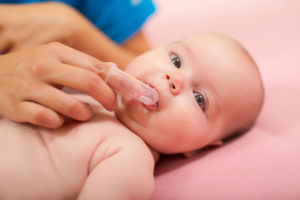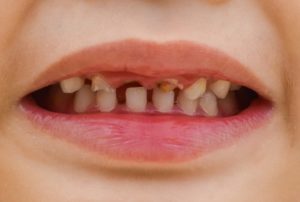When Should I Start (and Stop) Brushing My Child’s Teeth?
Being a parent is tough. Not only are there a million things on your to-do list; there are a lot of things that should be on your to-do list that often get forgotten. Then when a problem arises because you were not doing the things you should have been doing, you add another parenting burden: guilt.
We see it all the time. Countless moms and dads are shocked and then guilt-ridden to find out that their children have cavities or other problems in their mouths. Most of them never knew they were supposed to be caring for their children’s teeth in very specific ways. And honestly, they were just too tired to ask about yet another thing they should be doing.
When Should I Start Brushing My Child’s Teeth?
This answer is simple: as soon as he has teeth! If you see teeth, brush them. This means you will start brushing your child’s teeth when he or she is still an infant because most babies get their first teeth at six months of age.
 Now, when we say “brush”, it is a little different for babies than it is for adults. It would be more accurate to say “clean” or “remove plaque buildup”. You do not even have to use a toothbrush. You can remove all of the plaque buildup from baby teeth with a soft washcloth. You can also find baby toothbrushes with very soft rubbery bristles that slip over your finger.
Now, when we say “brush”, it is a little different for babies than it is for adults. It would be more accurate to say “clean” or “remove plaque buildup”. You do not even have to use a toothbrush. You can remove all of the plaque buildup from baby teeth with a soft washcloth. You can also find baby toothbrushes with very soft rubbery bristles that slip over your finger.
There are two huge advantages to brushing your child’s teeth so early:
-
Better Health!
By brushing your child’s teeth to remove plaque buildup, you lower his or her risk for cavities and gum disease. Healthy teeth and gums lead to better nutrition and growth.
-
Establishing a Routine
As you will see in our next section, you need to brush your child’s teeth for quite some time. The earlier you establish this as a routine, the easier it is for your child to accept. Waiting until your child is two or three years old to start brushing can lead to some serious tantrums. Brushing your kid’s teeth should not feel like wrestling an alligator every night. Start early, and be consistent!
When Should I Let My Child Brush His or Her Own Teeth?
This is a more difficult question because the answer will vary from child to child. Because children develop certain skills at different ages, we do not specify an age at which you can let your child take over his or her own oral hygiene. Instead, we use some other skills as benchmarks to determine whether your child is likely to have the manual dexterity to effectively brush his own teeth.
 Here is a short quiz to help you discern whether your child is ready to brush alone.
Here is a short quiz to help you discern whether your child is ready to brush alone.
- Can your child tie his or her shoelaces without help?
- Can your child write his or her name legibly?
- Can your child spit the toothpaste into the sink without swallowing any of it?
It is unlikely that any child can do all of these things before the age of six years. One of the best tactics is a slow transition of the oral hygiene responsibilities. Begin allowing your child to brush his or her teeth, and follow with a quick inspection and follow-up brushing of your own. Show the child areas that he might be missing and help him get to those areas.
One great tool for teaching your child to brush is a plaque-indicating tablet. These chewable tablets stain plaque buildup a bright color, so that both you and your child can see the areas he or she misses when they brush. Follow these steps to make the biggest impact on your child’s understanding of brushing.
- Have your child brush his or her teeth, and encourage him to do the best job possible.
- Give him a plaque-disclosing tablet to chew.
- Use a mirror to show him the areas missed with his first brushing.
- Let him re-brush those areas.
- Help with any areas he has a hard time reaching.
- Repeat every time he brushes to help him improve his brushing skills.
Why Didn’t Anyone Tell Me This Before My Child Got Cavities?
 That is a great question!
That is a great question!
Unfortunately, most pediatricians do not give great dental advice. Everyone knows to take their child to the pediatrician for check-ups, but few think that they need to see a dentist until the child is much older, with a full mouth of teeth. By this time, many problems may already be present.
We find that most of our child-patients’ parents simply do not know this information. If you are planning a family, file this info away for future reference. If you have loved ones with babies, share this blog with them so they have all the information they need to take great care of their babies.
BTW, you should be flossing those baby teeth, too . . .
More Questions about Taking Care of Your Child’s Teeth?
Call Designer Smiles today to set up a consultation with Dr. Ann and Dr. Lauren. They can answer any question you have about your baby and his or her teeth!
